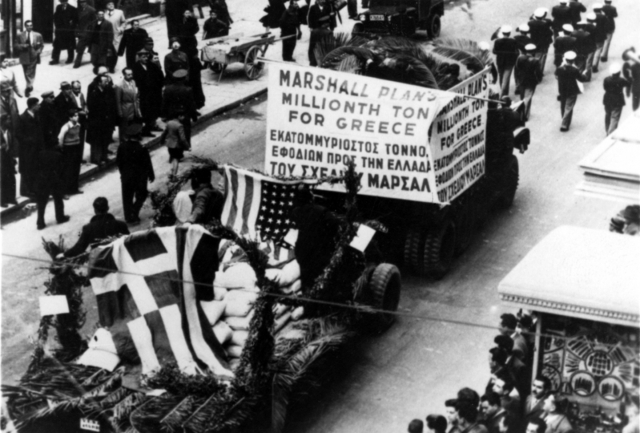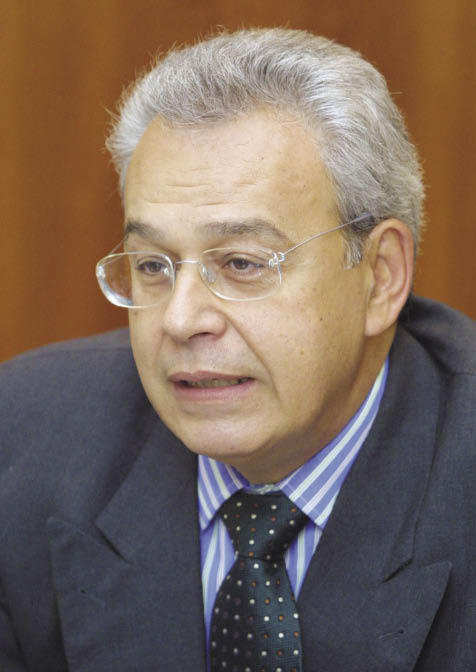Photo: Reuters/Yannis Behrakis
Anastasia Balezdrova
Greece’s difficult economic situation over the past five years has provided a platform for different commentators to present dozens of ideas about how to solve its financial problem.
Many of them looked back on history and particularly on the period after World War II, when war-stricken Greece was one of the beneficiaries of the Marshall Plan. It is the notorious US programme for the recovery of Europe that called on all European countries, including those in Eastern Europe that were under Soviet influence, to participate in it. Joseph Stalin however did not allow any of the satellite states of the Soviet Union to get involved in the plan. The only exception was Yugoslavia and that decision by Josip Tito marked the beginning of his conflict with Stalin.
Between 1948 and 1951, Greece received $366 million from the US under the Marshall Plan to recover from the consequences of both the World and the ensuing Civil War.

How much did the funds granted under the Marshall Plan and Truman Doctrine contribute towards Greece’s actual economic recovery after the devastating wars? Providing an answer to this question was the goal of the participants in a discussion that the American Hellenic Educational Progressive Association AHEPA organized in Athens.
 In his analysis before the participants, former Vice-President of the European Investment Bank Panagiotis Genimatas was adamant that the Marshall Plan did not save Greece and he even described it as unsuccessful in terms of achieving the high goals set. "From the beginning it was linked to the Greek laws for economic development whereas the Americans set the bar very high. The United States believed that the countries in Europe should develop based on the best models for economic recovery but this was not possible in the case of Greece. We can say that the plan was successful only with regard to the restoration of basic infrastructure and the management of the humanitarian situation." To indicate the reason for the failure, he referred to several reports by US officials who speak about rampant corruption and Greek governments that do not have the power to deal with the problems.
In his analysis before the participants, former Vice-President of the European Investment Bank Panagiotis Genimatas was adamant that the Marshall Plan did not save Greece and he even described it as unsuccessful in terms of achieving the high goals set. "From the beginning it was linked to the Greek laws for economic development whereas the Americans set the bar very high. The United States believed that the countries in Europe should develop based on the best models for economic recovery but this was not possible in the case of Greece. We can say that the plan was successful only with regard to the restoration of basic infrastructure and the management of the humanitarian situation." To indicate the reason for the failure, he referred to several reports by US officials who speak about rampant corruption and Greek governments that do not have the power to deal with the problems.
Genimatas made a comparison with Italy that "did not use the money received to mitigate the consequences of the war for a short while but spent it on long-term projects. As a result, it created the basis for the Italian "economic miracle" that followed later, ranking the country among the world's leading economies."
Panagiotis Genimatas defined the Marshall Plan as "the womb from which the European Union emerged." According to him, the contracts formalized the integration process. However, he was adamant that neither Greece nor Europe needed a new Marshall Plan today. "Regardless of how much money is available free of charge to people who cannot manage it properly and as intended, it will produce no result," Genimatas commented on Greece.
As for Europe, in his opinion, it has all the necessary internal mechanisms and tools to implement the policy of economic recovery, which it avoided using for the time being. Furthermore, the Maastricht Treaty contains all the necessary regulations and the delay of federalization of Europe is only delaying the recovery process of the entire European Union.
Genimatas presented interesting historical facts about the Marshall Plan and Truman Doctrine. One is that US President at the time Harry Truman was a member of AHEPA. According to Genimatas, neither of the two programmes saved Greece from communism, as is the common opinion because the country had never been threatened by joining the Eastern Bloc. "Stalin had no intention of violating the Yalta Agreement and he was not at all interested in Greek communists." Moreover, he said it was incorrect to call the Civil War as such in Greece. "Since a fraction, not the majority in the Greek Communist Party, took the decision to start the armed conflict, we cannot talk about a civil war but about a plain revolt."
Genimatas emphasized the historical role that the association AHEPA and thousands of its members played to "create and maintain a bridge between Greece and the United States." According to him, the strengthening of the economic power of the BRICS group of countries, and especially of China, leaves no doubt that Europe will be able to remain economically strong only if it intensifies its relations with the other side of the Atlantic.